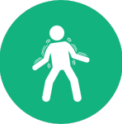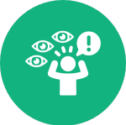Schizophrenia
What is Schizophrenia?
Schizophrenia is a treatable brain disorder that has affected people throughout history. About 1% of the population develops it during their lifetime. Schizophrenia appears to have a genetic link, but many factors may cause or increase the risk of developing it, including psychological, environmental, and social factors. Current research suggests that schizophrenia is caused by a chemical imbalance in the brain and may be related to excessive dopamine activity.

Schizophrenia Risk Signs
Schizophrenia is a complex mental health disorder that typically manifests between the ages of 16 and 30. It is rare for individuals to develop this condition after the age of 45. Notably, the onset of symptoms tends to occur at a younger age in men than in women. The risk of developing schizophrenia is influenced by several factors, which include:
Genetic Factors: A significant risk factor is having a family history of schizophrenia, indicating a potential genetic link.
Brain Chemistry: Imbalances in brain chemicals, which are essential for communication within the brain, may contribute to the development of schizophrenia.
Environmental Factors: Research suggests that certain environmental factors may increase the risk of schizophrenia. These include exposure to viruses, malnutrition during prenatal development, and complications during birth.
Understanding these risk factors is crucial for early identification and management of schizophrenia. If you are experiencing any symptoms that could be associated with schizophrenia, contact our behavioral healthcare team.
Symptoms of Schizophrenia
Schizophrenia, a complex mental health disorder, presents a range of symptoms that experts categorize into three distinct types:
Positive Symptoms:
These symptoms involve psychotic behaviors and thoughts not grounded in reality. They include:
Hallucinations:
Experiencing sensory perceptions, like hearing voices or seeing things, that aren't present in reality.
Delusions:
Holding firm beliefs in things that are clearly untrue or irrational.
Disorganized Thinking:
Struggling to organize thoughts, often resulting in incoherent speech.
Abnormal Motor Behavior:
Exhibiting unusual body movements or a complete lack of response.
Negative Symptoms:
These are characterized by a diminishment or absence of normal functions and emotions, such as:
Reduced Emotional Expression:
Displaying flat or unresponsive facial expressions and a monotone voice.
Alogia:
Speaking less than normal, which may include reduced quantity or content of speech.
Avolition:
Experiencing difficulty in starting or completing activities, especially those that involve planning or decision-making.
Anhedonia:
Having a diminished ability to experience pleasure.
Social Withdrawal:
Tending to withdraw from social interactions, often accompanied by a feeling of disconnection or apathy.
Recognizing these symptoms early is crucial for effective management and treatment of schizophrenia. If you are experiencing any of these symptoms of schizophrenia, seek the helping hand of a specialized schizophrenia healthcare team.
Types of Schizophrenia
There are five subtypes of schizophrenia: catatonic, disorganized, paranoid, residual, and undifferentiated. The type of disorder someone has will determine the types of symptoms they experience (e.g., hallucinations, delusions) and how severely affected they are by the illness (i.e., level of functioning).

Catatonic Type:
Involves abnormal movements, such as a lack of response or a delay in response to stimuli, and/or excessive and purposeless movement. This subtype also involves extreme negativism (resistance to instructions or attempts by others to be moved) or mutism. Catatonia is often associated with schizophrenia and can sometimes be an early warning sign of the disorder.

Disorganized Type:
This subtype involves disorganized thinking (e.g., having trouble organizing thoughts or speaking coherently), flat or inappropriate emotions (e.g., showing little reaction to very sad or disturbing circumstances), and odd behavior (e.g., wearing several layers of clothing even when it's hot).

Paranoid Type:
This subtype involves delusions and auditory hallucinations that frequently involve the person holding strong beliefs that others are trying to harm them or their property (e.g., believing that people on television or radio are sending special messages just for them, thinking strangers are talking about them when the conversation is in fact about something else).

Residual Type:
This subtype involves having some, but not all of the symptoms required for a diagnosis of schizophrenia. It mostly affects cognitive function (e.g., difficulties with memory, attention, and concentration) rather than emotional problems associated with psychosis.

Undifferentiated Type:
This subtype is diagnosed when a person has symptoms that meet the general diagnostic criteria for schizophrenia, but not those for any one of the other subtypes.
In addition to these five subtypes, two other classifications are sometimes used: Disorganized/Hebephrenic and Paranoid. Symptoms of the disorganized/Hebephrenic subtype are very similar to the disorganized subtype but are not as severe. The paranoid subtype involves delusions and hallucinations only (i.e., no significant problems with other thought or behavior patterns).
Schizophrenia Treatment at Path Behavioral Healthcare
At Path Behavioral Healthcare, we employ a comprehensive approach to managing schizophrenia, focusing on both alleviating symptoms and improving overall well-being. Our treatment plan typically includes a blend of counseling and medication, tailored to each individual's needs. Key components of our treatment strategy are:
Counseling - Cognitive-Behavioral Therapy (CBT): CBT is a type of psychotherapy that aims to modify dysfunctional emotions, behaviors, and thoughts through a goal-oriented, systematic procedure. It is effective in helping patients recognize and challenge negative thought patterns, thereby fostering positive behavioral changes. The primary aim is to equip patients with practical skills to manage their symptoms and improve their quality of life.
Medication - Antipsychotics: Regular use of antipsychotic medication is commonly recommended to control psychotic symptoms such as hallucinations and delusions. These medications play a crucial role in stabilizing mood and reducing the intensity of schizophrenia symptoms.

We are committed to providing personalized care to each patient. If you're considering treatment options and would like to learn more, we invite you to schedule a consultation with Path Behavioral Healthcare. You can reach out to our office directly or book an appointment online at your convenience.
